ear health
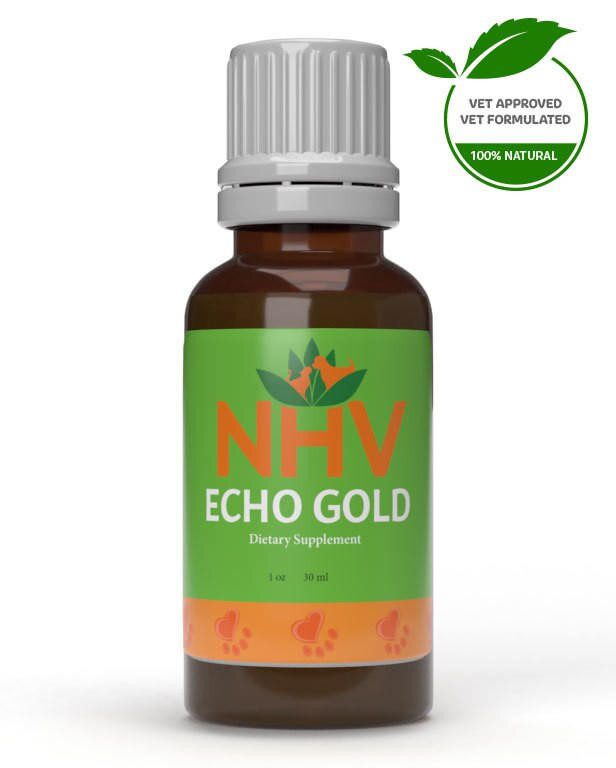
free shipping over $100 (USA & Canada)
1-877-937-4372 the pet expert hotline
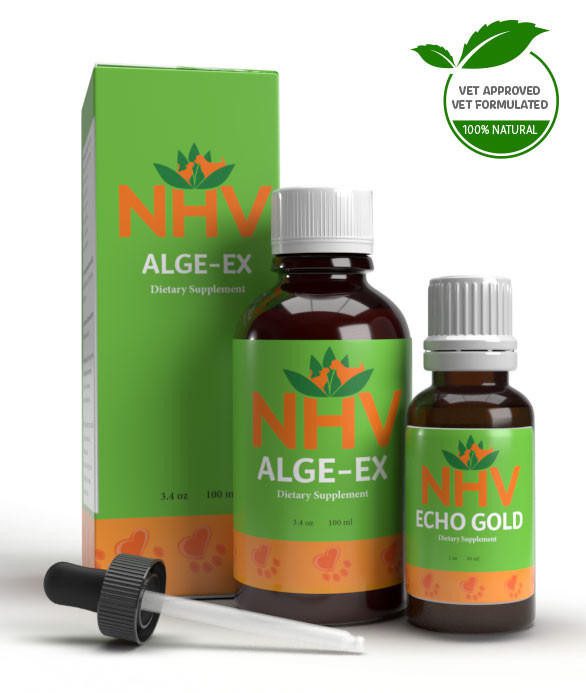
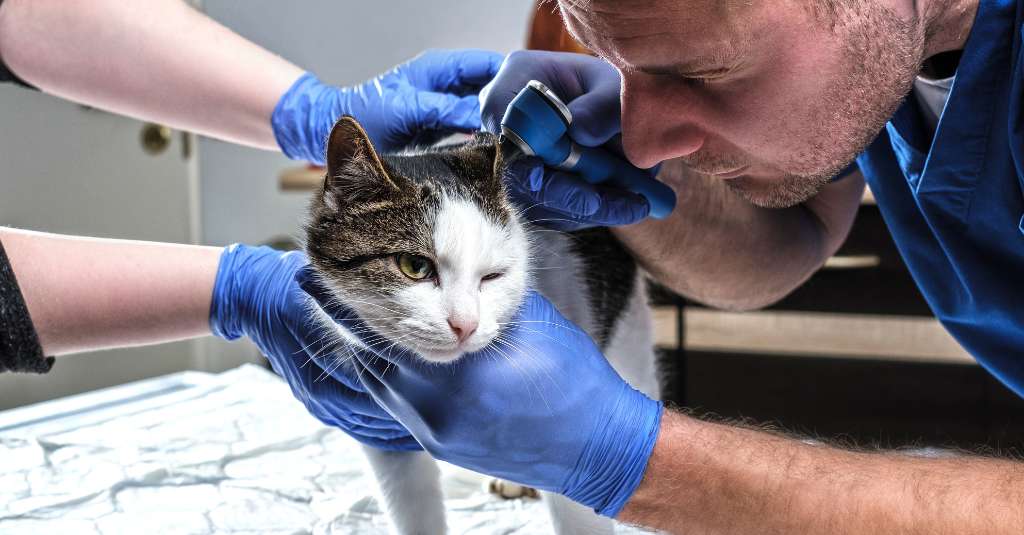
Dog and cat ear infections are a common health issue, often causing discomfort and distress for our beloved pets. While many infections clear up with appropriate treatment, some can persist, requiring diligent care and attention.
Various hidden health concerns may cause dog and cat ear infections, including…
Microbial Infections
Bacteria, yeast, and fungi are commonly behind ear infections in pets. These microbes thrive in warm, moist environments, making the ear canal an ideal environment.
Allergies
Allergic reactions to environmental factors like pollen, dust mites, or food can trigger inflammation in the ear canal, predisposing pets to recurrent infections.
Anatomy and Breed Predisposition
Pets with floppy ears, narrow ear canals, or excessive hair growth within the ears are more prone to infections. Certain breeds, such as Cocker Spaniels and Basset Hounds, are genetically predisposed to ear problems.
Underlying Health Conditions
Systemic diseases like hypothyroidism, autoimmune disorders, or hormonal imbalances can weaken the immune system, making pets more susceptible to infections.

If you notice these symptoms in your little one, please take them to a vet immediately for tests and diagnosis.
There are 4 ways to diagnose ear infections in dogs and cats . The initial step is a thorough physical examination. This examination involves visual inspection and palpation to identify signs of infection, inflammation, or structural abnormalities within the ears. Following this, your vet may perform ear cytology to identify the organisms in your pet’s ear. It is a microscopic examination of ear swabs that helps veterinarians pinpoint the presence of bacteria, yeast, or fungi, providing crucial guidance for appropriate treatment. For suspected allergies, testing (intradermal or blood tests) helps identify specific allergens triggering the immune response.
To gain a deeper understanding, imaging studies, such as radiographs or computed tomography (CT) scans, can assess underlying anatomical abnormalities or determine the extent of the infection.
Once the vet has pinpointed the cause and extent of infection, a comprehensive management plan should follow.
Regular veterinary monitoring is also important as it allows veterinarians to monitor treatment progress and adjust medications as needed.
Regular veterinary monitoring is also important as it allows veterinarians to monitor treatment progress and adjust medications as needed.
In complementing traditional treatment, natural supplements can play a crucial role in supporting the healing process for your little one. NHV offers vet-formulated supplements designed to address specific issues:
NHV Echo Gold serves as an ear drop supplement aimed at aiding ear infections. It contributes to reducing discomfort and inflammation, alleviating behaviors such as rubbing, itching, and scratching of the ear. Additionally, it assists in stopping discharge and managing unpleasant odors associated with ear issues.
For environmental or seasonal allergies, we recommend NHV Alge-Ex. This supplement may help alleviate symptoms such as sneezing, itching, scratching, and rubbing of the eyes and ears while also working to decrease inflammation in the upper respiratory tract.
NHV Stimmune, a natural immune system support supplement, may promote overall skin health in pets. Notably, it stands as a leading product in addressing symptoms linked to food allergies, including persistent scratching and itching.
Incorporating these NHV supplements into your pet’s wellness routine can help promote healing. We recommend you always consult with your veterinarian to ensure a comprehensive and tailored approach to your pet’s health and well-being.
Recurring ear infections in dogs and cats are a significant challenge for pet owners and veterinarians alike. By understanding the underlying causes, recognizing early signs and symptoms, and implementing comprehensive management strategies, we can help alleviate discomfort and improve the quality of life for our pets.
If you have any questions, please don’t hesitate to click the button below to connect with us!
ear health

Herbal Ear Drops for Cats
buy 2 and save $3
If you notice inflammation and redness in your kitty’s ears, a funny smell, or if you catch them constantly shaking their head, they may be suffering from an ear infection! NHV Echo Gold for Cats contains anti-inflammatory herbs that help reduce swelling and redness, alleviate discomfort, and promote ear healing. It is 100% natural and free of preservatives, additives, flavorings, or artificial color.

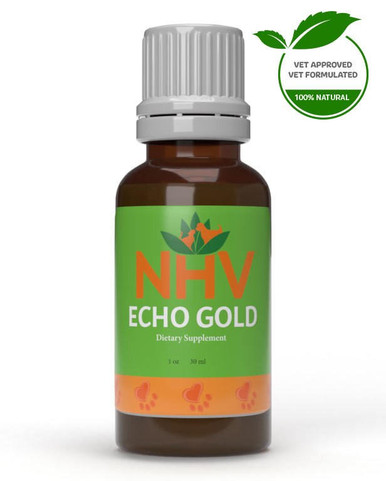
If you notice inflammation and redness in your kitty’s ears, a funny smell, or if you catch them constantly shaking their head, they may be suffering from an ear infection! NHV Echo Gold for Cats contains anti-inflammatory herbs that help reduce swelling and redness, alleviate discomfort, and promote ear healing. It is 100% natural and free of preservatives, additives, flavorings, or artificial color.

We understand how distressing it is to see your beloved kitty struggle with ear problems. Bacterial and yeast infections, allergies, and parasites like ear mites in cats can all cause ear infections, leading to pain, irritation and inflammation in their ears.
Echo Gold for Cats is a natural ear infection remedy designed to promote your kitty's ear wellness. When used alongside traditional treatment and vet-prescribed medicines, Echo Gold can offer gentle support in addressing ear issues and soothing discomfort in your beloved kitties.
NHV Echo Gold, a herbal ear drops for cats, is a natural remedy for kitties suffering from ear infections. This vet-formulated blend helps combat bacterial and yeast infections and ear mites, that are often the causes behind ear infections in cats. Echo Gold's gentle yet powerful ingredients (chamomile, Goldenseal, Echinacea angustifolia, Myrrh, and tea tree oil) work synergistically to help soothe inflammation, reduce itchiness, odor, and redness, and ease discomfort caused by ear diseases.
Chamomile, Myrrh, and Echinacea’s antimicrobial properties help soothe and heal inflamed skin and wounds within and around the ear, reducing discomfort and irritation. Myrrh also acts as an antiseptic that helps speed the healing process. Goldenseal's broad-spectrum antibiotic activity and anti-inflammatory benefits assist in alleviating ear irritations and fighting bacterial and fungal infections.
The last ingredient, tea tree oil, is very helpful in treating external parasites like ear mites in cats while also eliminating unpleasant odors.
Echo Gold's human-grade ingredients are organically grown or ethically harvested. As with all NHV products, the ear drops for cats is made in Canada in a GMP-certified and FDA-approved facility.
Ear infections could be a complication of an underlying disease. It is vital to pinpoint the root cause in order to cure your cat.
Here are some possible reasons behind your kitty’s infection:
Ear Infections can be painful and may even lead to irreversible consequences like deafness when it gets out of hand. Therefore, you should take your pet to a vet as soon as you notice something wrong.
Be alert if you notice:
This product, and all our other supplements, contains no added preservatives or additives. Therefore, please store it in a cool, dry place. The shelf life after opening is six months. It is also third-party tested for quality assurance and of human-grade quality. So, you can rest assured it is entirely safe for your little one.
Reach out to our Pet Experts if you have any questions or concerns.
Order NHV Echo Gold Ear Drops for Cats now to keep your kitty’s fuzzy ears healthy!
Echo Gold can provide excellent proactive support for your little one’s ear health. On top of that, regularly inspecting and cleaning your kitty’s ears are also very important to prevent ear disease or help stop it before it worsens. Always check to see if there are any redness, residue, or funky smells in their ears. Note that healthy ears are pale pink and clean. We recommend letting your vet clean those ears for your kitty.
Feel free to check out our YouTube short on caring for your kitty with ear infections.
All NHV supplements are made with the finest quality organic or ethically harvested herbs.
We use non-GMO vegetable glycerin as our base. NHV products are full-spectrum extracts.
Warm the Echo Gold by running under hot water for 30 seconds. Shake well to loosen the mixture. Place 1-2 drops into your cat’s ear canal and using a cotton swab apply 1-3 drops to the outer ear as well. This is for topical use only.
Want to learn how to clean your cat’s ears? Here is a short video to walk you through it:
We understand how distressing it is to see your beloved kitty struggle with ear problems. Bacterial and yeast infections, allergies, and parasites like ear mites in cats can all cause ear infections, leading to pain, irritation and inflammation in their ears.
Echo Gold for Cats is a natural ear infection remedy designed to promote your kitty's ear wellness. When used alongside traditional treatment and vet-prescribed medicines, Echo Gold can offer gentle support in addressing ear issues and soothing discomfort in your beloved kitties.
NHV Echo Gold, a herbal ear drops for cats, is a natural remedy for kitties suffering from ear infections. This vet-formulated blend helps combat bacterial and yeast infections and ear mites, that are often the causes behind ear infections in cats. Echo Gold's gentle yet powerful ingredients (chamomile, Goldenseal, Echinacea angustifolia, Myrrh, and tea tree oil) work synergistically to help soothe inflammation, reduce itchiness, odor, and redness, and ease discomfort caused by ear diseases.
Chamomile, Myrrh, and Echinacea’s antimicrobial properties help soothe and heal inflamed skin and wounds within and around the ear, reducing discomfort and irritation. Myrrh also acts as an antiseptic that helps speed the healing process. Goldenseal's broad-spectrum antibiotic activity and anti-inflammatory benefits assist in alleviating ear irritations and fighting bacterial and fungal infections.
The last ingredient, tea tree oil, is very helpful in treating external parasites like ear mites in cats while also eliminating unpleasant odors.
Echo Gold's human-grade ingredients are organically grown or ethically harvested. As with all NHV products, the ear drops for cats is made in Canada in a GMP-certified and FDA-approved facility.
Ear infections could be a complication of an underlying disease. It is vital to pinpoint the root cause in order to cure your cat.
Here are some possible reasons behind your kitty’s infection:
Ear Infections can be painful and may even lead to irreversible consequences like deafness when it gets out of hand. Therefore, you should take your pet to a vet as soon as you notice something wrong.
Be alert if you notice:
This product, and all our other supplements, contains no added preservatives or additives. Therefore, please store it in a cool, dry place. The shelf life after opening is six months. It is also third-party tested for quality assurance and of human-grade quality. So, you can rest assured it is entirely safe for your little one.
Reach out to our Pet Experts if you have any questions or concerns.
Order NHV Echo Gold Ear Drops for Cats now to keep your kitty’s fuzzy ears healthy!
Echo Gold can provide excellent proactive support for your little one’s ear health. On top of that, regularly inspecting and cleaning your kitty’s ears are also very important to prevent ear disease or help stop it before it worsens. Always check to see if there are any redness, residue, or funky smells in their ears. Note that healthy ears are pale pink and clean. We recommend letting your vet clean those ears for your kitty.
Feel free to check out our YouTube short on caring for your kitty with ear infections.
All NHV supplements are made with the finest quality organic or ethically harvested herbs.
We use non-GMO vegetable glycerin as our base. NHV products are full-spectrum extracts.
Warm the Echo Gold by running under hot water for 30 seconds. Shake well to loosen the mixture. Place 1-2 drops into your cat’s ear canal and using a cotton swab apply 1-3 drops to the outer ear as well. This is for topical use only.
Want to learn how to clean your cat’s ears? Here is a short video to walk you through it:
immune & allergy support

Holistic Remedy for Food Allergies and Immune Support in Cats
buy 2 and save $3
3 month supply for a small to medium size
Helps your cat overcome food allergies, skin allergies, and fight infection.

Helps your cat overcome food allergies, skin allergies, and fight infection.
Cats can be allergic to the things they eat and touch, just like people can. With NHV’s Stimmune, your kitty will get potent immune supporting herbs that help support your cat with food allergy reactions, as well as reactions related to fleas, dermatitis, insect bites, diet, and exposure to chemicals and drugs. For seasonal or environmental allergies, please try Alge-Ex for a remedy specifically formulated for your cat.
At NHV, all of our pet products are formulated by a master herbalist as well as a holistic veterinarian having more than 20 years of experience. Some ingredients are even wild-crafted which means they were ethically harvested from their natural environment. Our products are also safe for long-term use and are supplements that animals like to take, including finicky kitties.
If you have questions about holistic remedies for cat allergies to food or any of our wide variety of products, you can ask an NHV expert. Our very supportive professional team of pet experts are here to help and recommend supplements because, at NHV, we want your kitty feeling pawtastic naturally!
Stimmune Is Also Helpful for:
Cats can get food allergies from their diet, and other allergies from their environment when allergens are inhaled, ingested, or absorbed by the body. Once this happens, the immune system overreacts, and this is when your kitty will need extra balance and support.
Read about a senior cat’s Helenda’s transformation using Stimmune.
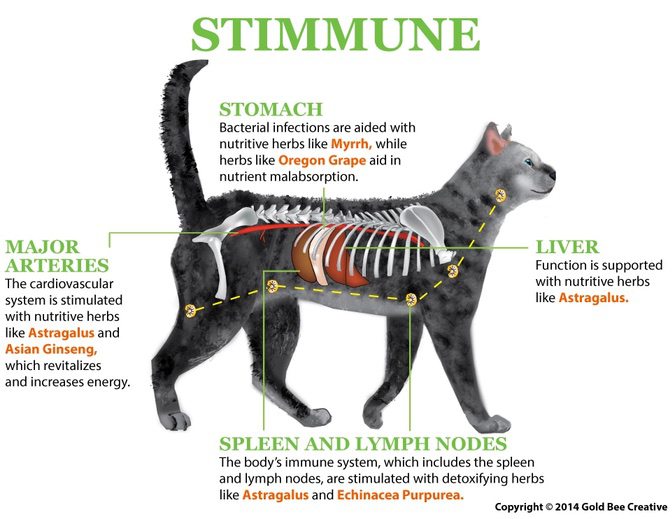
How NHV’s Stimmune Helps Allergies in Cats
Stimmune promotes healthy immune activity and histamine response with five natural herbs formulated to reduce environmental allergies in cats.
Stimmune provides support in addition to conventional treatment for all forms of allergies including pollen allergies in cats.
Select your pet's weight to determine the correct dose.
Cats can be allergic to the things they eat and touch, just like people can. With NHV’s Stimmune, your kitty will get potent immune supporting herbs that help support your cat with food allergy reactions, as well as reactions related to fleas, dermatitis, insect bites, diet, and exposure to chemicals and drugs. For seasonal or environmental allergies, please try Alge-Ex for a remedy specifically formulated for your cat.
At NHV, all of our pet products are formulated by a master herbalist as well as a holistic veterinarian having more than 20 years of experience. Some ingredients are even wild-crafted which means they were ethically harvested from their natural environment. Our products are also safe for long-term use and are supplements that animals like to take, including finicky kitties.
If you have questions about holistic remedies for cat allergies to food or any of our wide variety of products, you can ask an NHV expert. Our very supportive professional team of pet experts are here to help and recommend supplements because, at NHV, we want your kitty feeling pawtastic naturally!
Stimmune Is Also Helpful for:
Cats can get food allergies from their diet, and other allergies from their environment when allergens are inhaled, ingested, or absorbed by the body. Once this happens, the immune system overreacts, and this is when your kitty will need extra balance and support.
Read about a senior cat’s Helenda’s transformation using Stimmune.

How NHV’s Stimmune Helps Allergies in Cats
Stimmune promotes healthy immune activity and histamine response with five natural herbs formulated to reduce environmental allergies in cats.
Stimmune provides support in addition to conventional treatment for all forms of allergies including pollen allergies in cats.
Select your pet's weight to determine the correct dose.
seasonal allergy support
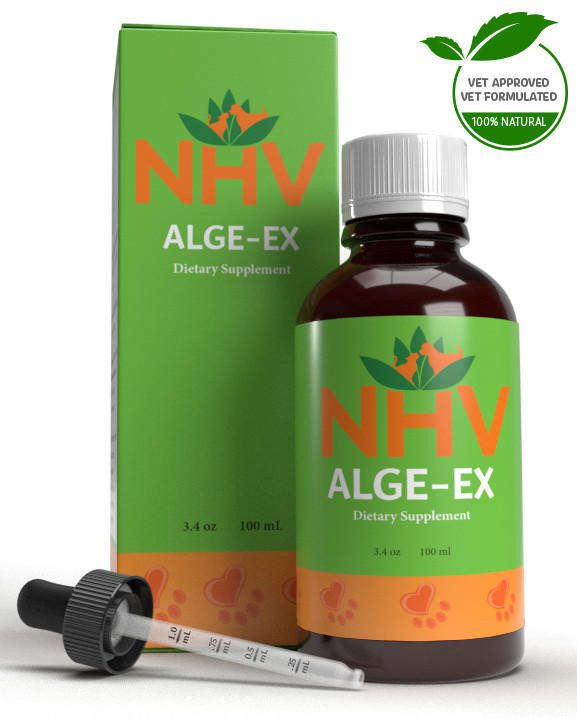
Herbal Support for Cats with Allergies
buy 2 and save $3
3 month supply for a small to medium size pet.
Are you looking for natural holistic supplements for cats with allergies? NHV Alge-Ex for Cats can help relieve allergy symptoms in cats and proactively support hay fever and environmental and seasonal allergies in your little one.

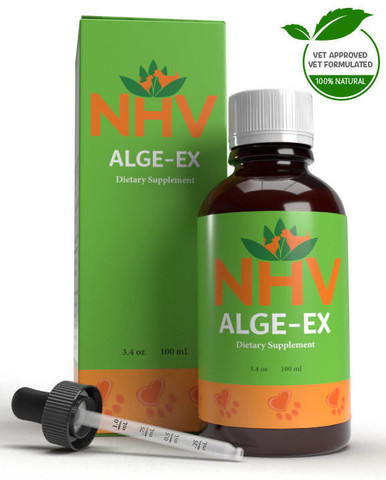
Are you looking for natural holistic supplements for cats with allergies? NHV Alge-Ex for Cats can help relieve allergy symptoms in cats and proactively support hay fever and environmental and seasonal allergies in your little one.

Scratching, sneezing and wheezing - it is never easy to see your beloved kitty suffer from allergic reactions. How can we make our furkiddos feel better?
Natural supplements like NHV’s Alge-Ex for Cats can proactively protect your cat from environmental and seasonal allergies and help relieve the symptoms alongside traditional medication.
All our supplements are 100% natural and free of preservatives, additives, flavorings, or artificial color. You can rest assured they are completely safe for your little one.
As the name suggests, environmental allergies are caused by foreign substances in our surroundings. This can be pollens, mold, grass, fleas, other pets, and dust mites. Allergic reactions can be triggered by ingesting these allergens or being in physical contact with them. Even though cat environmental allergies are usually seasonal, the symptoms can last all year.
If you notice these symptoms, please visit a vet for a body check and allergy test.
The blend of herbs in Alge-Ex contains powerful anti-inflammatory and antispasmodic properties that can help soothe the swelling and stomachache caused by allergies. Herbs like eyebright have been used internally for catarrh of the upper respiratory tract and can help with eye itchiness. Echinacea Angustifolia, additionally, has been used to help with sinusitis in dogs and cats, hay fever, asthma, and ear infections.
Alge-Ex for Cats and our other products are liquid-based and have a dropper, making them extremely easy to administer to pets. They can be given directly in the cheek pockets or mixed with food.
Please reach out if you have any questions or concerns about cats with allergies or anything else! We have a team of supportive Pet Experts who are always here to help you and your kitty!
Help protect your cat from allergies by ordering our Alge-Ex for Cats!
All NHV supplements are made with the finest quality organic or ethically harvested herbs.
We use non-GMO vegetable glycerin as our base. NHV products are full-spectrum extracts.
Select your pet's weight to determine the correct dose.
To be taken twice daily. Determine your pet’s weight and then use the easy chart below to determine the correct dose. This is the minimum dosage.
Pet's Weight Dosage
0 - 15 lb = 0.5 ml
16 - 30 lb = 1.0 ml
31 - 45 lb = 1.5 ml
46 - 60 lb = 2.0 ml
61 - 75 lb = 2.5 ml
Over 75 lb = 3.0 ml
How to Administer: Shake well before use. The easiest method is to use the dropper provided and place the drops into your pet’s food or favorite treat. You can also use the dropper and squirt directly into the pet’s mouth. Some pets can be finicky, if this occurs consider hiding the drops in foods most pet’s love such as fish, chicken, yogurt, or a favorite treat. If your pet only eats dry food then soak a few kibbles at feeding time.
For Best Results
Herbal dietary supplements are beneficial to the health and well-being of your pet and are safe for long-term use. Every pet responds to natural herbal supplements differently, therefore it is important to be consistent and administer the product daily. Supplements generally take two to four weeks to take effect, however this will vary from one animal to the next.
Product Storage
All NHV Natural Pet Products are pure herbal extracts and contain no artificial additives, preservatives, or coloring. Shelf life after opening is 6 months and must be refrigerated after opening.
Cautions and Contraindications
Do not use Alge-Ex in pregnant or nursing animals.
Speak to your vet before using our products. A second visit is recommended if your pet’s condition does not improve, or deteriorates after continued use of the supplements.
All information provided by NHV Natural Pet Products is for educational purposes only.
Scratching, sneezing and wheezing - it is never easy to see your beloved kitty suffer from allergic reactions. How can we make our furkiddos feel better?
Natural supplements like NHV’s Alge-Ex for Cats can proactively protect your cat from environmental and seasonal allergies and help relieve the symptoms alongside traditional medication.
All our supplements are 100% natural and free of preservatives, additives, flavorings, or artificial color. You can rest assured they are completely safe for your little one.
As the name suggests, environmental allergies are caused by foreign substances in our surroundings. This can be pollens, mold, grass, fleas, other pets, and dust mites. Allergic reactions can be triggered by ingesting these allergens or being in physical contact with them. Even though cat environmental allergies are usually seasonal, the symptoms can last all year.
If you notice these symptoms, please visit a vet for a body check and allergy test.
The blend of herbs in Alge-Ex contains powerful anti-inflammatory and antispasmodic properties that can help soothe the swelling and stomachache caused by allergies. Herbs like eyebright have been used internally for catarrh of the upper respiratory tract and can help with eye itchiness. Echinacea Angustifolia, additionally, has been used to help with sinusitis in dogs and cats, hay fever, asthma, and ear infections.
Alge-Ex for Cats and our other products are liquid-based and have a dropper, making them extremely easy to administer to pets. They can be given directly in the cheek pockets or mixed with food.
Please reach out if you have any questions or concerns about cats with allergies or anything else! We have a team of supportive Pet Experts who are always here to help you and your kitty!
Help protect your cat from allergies by ordering our Alge-Ex for Cats!
All NHV supplements are made with the finest quality organic or ethically harvested herbs.
We use non-GMO vegetable glycerin as our base. NHV products are full-spectrum extracts.
Select your pet's weight to determine the correct dose.
To be taken twice daily. Determine your pet’s weight and then use the easy chart below to determine the correct dose. This is the minimum dosage.
Pet's Weight Dosage
0 - 15 lb = 0.5 ml
16 - 30 lb = 1.0 ml
31 - 45 lb = 1.5 ml
46 - 60 lb = 2.0 ml
61 - 75 lb = 2.5 ml
Over 75 lb = 3.0 ml
How to Administer: Shake well before use. The easiest method is to use the dropper provided and place the drops into your pet’s food or favorite treat. You can also use the dropper and squirt directly into the pet’s mouth. Some pets can be finicky, if this occurs consider hiding the drops in foods most pet’s love such as fish, chicken, yogurt, or a favorite treat. If your pet only eats dry food then soak a few kibbles at feeding time.
For Best Results
Herbal dietary supplements are beneficial to the health and well-being of your pet and are safe for long-term use. Every pet responds to natural herbal supplements differently, therefore it is important to be consistent and administer the product daily. Supplements generally take two to four weeks to take effect, however this will vary from one animal to the next.
Product Storage
All NHV Natural Pet Products are pure herbal extracts and contain no artificial additives, preservatives, or coloring. Shelf life after opening is 6 months and must be refrigerated after opening.
Cautions and Contraindications
Do not use Alge-Ex in pregnant or nursing animals.
Speak to your vet before using our products. A second visit is recommended if your pet’s condition does not improve, or deteriorates after continued use of the supplements.
All information provided by NHV Natural Pet Products is for educational purposes only.
Published: February 14, 2024